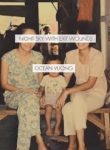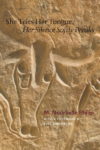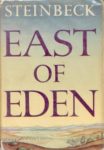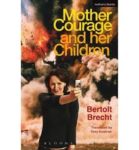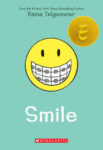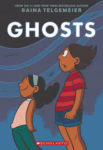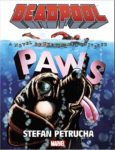BookThugs Read: Our Fave Books of 2016, The Editors’ Edition
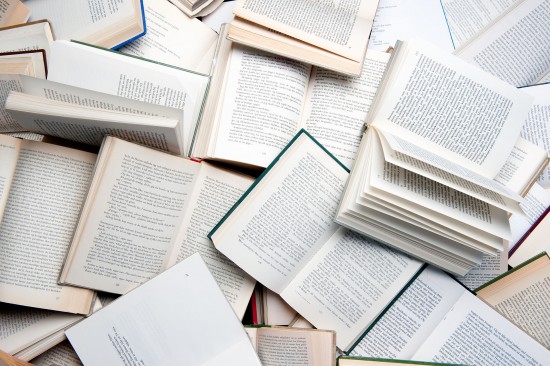
2016 has been a rough ride. In fact, for many of us it’s been downright awful. But we won’t revisit the reasons why (after all, we already know why….). In this latest edition of BookThugs Read our goal is to celebrate something good about the past year. In particular, we’re paying tribute to some of our favourite reads of 2016. In a year that saw many sad losses, and brought far too much heartbreak, books, like the dear friends they are, were there for us. Whether to escape the news, even if for just a little while, or to help provide some clarity or understanding about the state of the world, books have been a shoulder for us to lean on.
Today, we turn things over to Team BookThug to reflect on a year in reading. Here are some of our favourite books that we read in 2016, with contributions from Jay Millar, Hazel Millar, Malcolm Sutton, Julie Joosten, Ruth Zuchter, John Schmidt, Kate Hargreaves, Reid Millar and Cole Millar.
Jay Millar, Publisher
Moby Dick by Herman Melville (1851)
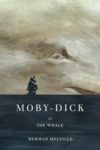
This is what I chose to read during my summer holiday. Why? Mostly because I never read it before, and a number of people had told me earlier this year that it is a must read, a book that they themselves read at least once a year. So I went found the ugliest and most unreadable copy I could find (a $3 Wordsworth Classic) and I read the beast over a two week stint: one week in Prince Edward County; one week in The Bruce. After the fact, I can say I’m glad that I did this book, despite my guilt at reading another dead white guy when part of my goal this year was to diversify my reading habits — Moby Dick truly is a strange and wonderful book. But what made it a great book to read last summer was the timing: as the US election race heated up it was easy to see that Melville, writing in the latter half of the 1800s, could see two possibilities for the future of his beloved America. The first is that of his narrator, who is part Ishmael and part Melville, a visionary sub sub librarian who is expansive beyond compare and overly generous and democratic with his knowledge. This is the reason Moby Dick as a novel would never be published today: it is a cup that runneth over as a narrative within the scope of Ishmael/Melville’s visionary prowess. No self respecting editor would let Melville get away with it lest his book be a complete and utter failure in the marketplace (which Moby Dick was during Melville’s lifetime, by the way). But the other version of America is wrapped up in the figure of Captain Ahab (who is also part Melville too, I should concede), that singular and obsessive leader, pressuring his subordinates into a foolhardy quest that is selfish and insane. These are two possibilities Melville proposes when he wrote Moby Dick, and it is easy to see which of them the will of the people in America has chosen in 2016.
The Year of Magical Thinking by Joan Didion (Knopf, 2005)

I can’t quite recall why I picked this up. Oh, wait, it’s because Hazel took it out of the library and it was sitting at the top of one of her giant piles of books she has been reading. I hadn’t read Didion before, and the subject of this book caught my attention. The Year of Magical Thinking is a response piece to the sudden death of Didion’s husband John Gregory Dunne. The circumstances of the moment of Dunne’s passing were odd: Dunne died of a massive heart attack one evening in late December 2003 while he and Didion were home having dinner, having just returned from the hospital where their only daughter Quintana was on life support in an induced coma. Didion waited until Quintana recovered enough to bury her husband. Then, a month later, Quintana collapsed at LAX and underwent a prolonged surgery to relieve a massive hematoma. And so the book is framed against Didion suffering the loss of her husband of 40 years, while dealing with the tragedy of her daughter’s precarious health. I don’t know how Didion managed to write the book. I suspect that had something even remotely similar happened to me I would not be able to function, let alone write a cohesive sentence. But Didion manages to capture something magical about grieving and mourning and openly shares the experience of a life lived in close proximity to another life. Somehow, The Year of Magical Thinking beautifully captures not only the echoing chamber of the heart, but of memory itself. I loved the almost unbearable intimacy of this book, and the peek into the lives of a very close couple who did almost everything together in the 40 years they were married: raising their daughter, writing their books, meeting deadlines for journals and newspapers, working on films, etc. Honestly, the whole thing may have been a little too close to home. Hazel and I live somewhat parallel lives, which I love and cherish deeply. Now, in the shadow of this book, my life with her also terrifies me is a curiously beautiful way.
Hazel Millar, Managing Editor
I read almost non-stop this year. It was a necessary coping strategy. As of writing this, I’ve read 107 books, not including BookThug books and/or manuscripts. I’ll probably never achieve this again but hopefully there won’t be another year like 2016 again.
It was really difficult for me to select my top 5 books, and so, just because, I’m actually including 6. I could have listed so many more, including The Door by Magda Szabo, The Red Parts by Maggie Nelson, Little Labours by Rivka Galchen, Problems by Jade Sharma, or Witness, I Am by Gregory Scofield. I also always want to include books that we’ve published. Please assume those titles in addition to the ones below. So, after giving it much thought, here are 6 books that I really loved this year.
Bluets by Maggie Nelson (Wave Books, 2009)
An enchanting gem of a book about a love affair with the colour blue. It’s no secret that I adore Maggie Nelson. I am truly glad to be alive in a world where Nelson thinks and writes. I believe her to be one of the most important critical thinkers of today.
blue. It’s no secret that I adore Maggie Nelson. I am truly glad to be alive in a world where Nelson thinks and writes. I believe her to be one of the most important critical thinkers of today.
Sidewalks by Valeria Luiselli, translated by Christina MacSweeney (Coffee House Press, 2013)
 This year, I read all of Luiselli’s work, including The Story of My Teeth and Faces in the Crowd. In this slim and superb collection of essays, Luiselli muses about underused spaces, literary heroes, urban living, maps and passionate wandering. Her manifesto on cycling is worth the read alone.
This year, I read all of Luiselli’s work, including The Story of My Teeth and Faces in the Crowd. In this slim and superb collection of essays, Luiselli muses about underused spaces, literary heroes, urban living, maps and passionate wandering. Her manifesto on cycling is worth the read alone.
A Manual for Cleaning Women: Selected Stories by Lucia Berlin (Farrar, Straus and Giroux, 2015)
Initially I thought I would only read a handful of the stories in this
c ollection, mainly to get a taste of Berlin’s writing, but also because it’s quite a big book. I don’t commit easily to 450+ page books these days because there are simply too many books that I want to read and never enough time. But I was hooked from the get go and read through the entire collection. Berlin’s stories gently tap you on the back and then punch you squarely in the gut. I’m only sad to have discovered her writing after her death.
ollection, mainly to get a taste of Berlin’s writing, but also because it’s quite a big book. I don’t commit easily to 450+ page books these days because there are simply too many books that I want to read and never enough time. But I was hooked from the get go and read through the entire collection. Berlin’s stories gently tap you on the back and then punch you squarely in the gut. I’m only sad to have discovered her writing after her death.
The Empathy Exams: Essays by Leslie Jamison (Greywolf Press, 2014)
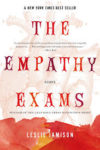 I saw Leslie Jamison on a panel with Maggie Nelson earlier this year at AWP. I was unfamiliar with her work before this but her talk was so compelling that I immediately picked up this book of essays and read it straight through. Simply stated, it is amazing. I can’t recommend it enough. Plus, here’s a little piece of trivia: one of the essays in this collection inspired a documentary about running and ultramarathons called “The Barkley Marathons.” Check it out on Netflix. But read the book first.
I saw Leslie Jamison on a panel with Maggie Nelson earlier this year at AWP. I was unfamiliar with her work before this but her talk was so compelling that I immediately picked up this book of essays and read it straight through. Simply stated, it is amazing. I can’t recommend it enough. Plus, here’s a little piece of trivia: one of the essays in this collection inspired a documentary about running and ultramarathons called “The Barkley Marathons.” Check it out on Netflix. But read the book first.
So Much Synth by Brenda Shaughnessy (Copper Canyon Press, 2016)
Earlier this year, I finally read Shaughnessy’s previous collect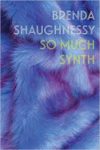 ion, Our Andromeda. It’s been a long time since I’ve wept that uncontrollably over a book. Afterwards, I vowed to read all of her work. Her latest collection made me weep all over again but it also made me laugh and feel nostalgic for girlhood. There is a poem about Duran Duran, for goodness sake! It was like reading a letter to my teenage self.
ion, Our Andromeda. It’s been a long time since I’ve wept that uncontrollably over a book. Afterwards, I vowed to read all of her work. Her latest collection made me weep all over again but it also made me laugh and feel nostalgic for girlhood. There is a poem about Duran Duran, for goodness sake! It was like reading a letter to my teenage self.
Night Sky with Exit Wounds by Ocean Vuong (Copper Canyon Press, 2016)
This is one of the most stunning debut poetry collections I’ve ever read. I read it, then read it again, and then I read it again out loud. Then I read anything and everything I could find about Ocean Vuong. I can’t wait to see what else he gifts us in the future.
As a little aside, I had the honour of briefly meeting Ocean in Brooklyn earlier this year. He asked me if I am a poet and I shyly answered, no, but that I am a poetry fan girl. I also told him that I work in publishing and that I get to work with many wonderful poets. He asked me the name of our press and when I told him, he paused for a moment, and then said, “Oh, BookThug! I love BookThug! You guys are great.” It took a while for me to come back down from Cloud 9 after that.
Malcolm Sutton, Fiction Editor, and author of Job Shadowing
(Preamble: I always want to include books that I worked on as an editor. Please assume those titles in addition to the ones below.)
From the Archives of Vidéo Populaire by Anne Golden
(Pedlar Press, 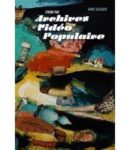 2016)
2016)
A novel written as an oral history of the early days of video art and artist collectives. Golden takes us to this fascinating moment in art making and politics in Quebec. This feels like a special book.
Garments Against Women by Anne Boyer (Ahsahta Press, 2015)
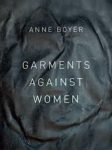 I noted after I read this in the summer to remember it for a best-of list, and I don’t remember the contents very well. I remember that these prose poems are alive and full of so much tension.
I noted after I read this in the summer to remember it for a best-of list, and I don’t remember the contents very well. I remember that these prose poems are alive and full of so much tension.
The Lost Plays of Greek Tragedy, Vol. 1: Neglected Authors by Matthew Wright (Bloomsbury, 2016)
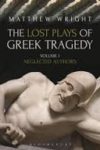 I recognize that this is an unusual ‘best book’ kind of book. It is what the title suggests – a study of Greek tragedies and playwrights that we barely know even existed. I’ve never read a book with so many warnings about the unknowability of what is being presented. It’s kind of sublime in this way.
I recognize that this is an unusual ‘best book’ kind of book. It is what the title suggests – a study of Greek tragedies and playwrights that we barely know even existed. I’ve never read a book with so many warnings about the unknowability of what is being presented. It’s kind of sublime in this way.
Discovering the World by Clarice Lispector (trans. Giovanni Pontiero, Carcanet Press, 1992)
Carcanet Press, 1992)
I include this on the list because I recommend that some publisher bring it back into print. This is the English version of Lispector’s collected chronicles (amounting to over 600 pages) that she wrote for the Jornal de Brasil between 1967 and the end of 1973. I love to think that these stunning, deeply personal essays were published in a major newspaper.
The Clouds by Juan José Saer, translated by Hilary Vaughn Dobel, Open Letter, 2016)
Published in the original Spanish in 1997, another book by Saer is always welcome.

Julie Joosten, Editor of the Essais Series, and author of Light Light (2013)
She Tries Her Tongue, Her Silence Softly Breaks by
M. NourbeSe Philip (Wesleyan University Press, 1998)
Ardour by Nicole Brossard,translated by Angela Carr
(Coach House Books, 2016)
Dancing on our Turtles Back: Stories of Nishnaabeg Re-Creation, Resurgence, and a New Emergence by Leanne Simpson
The Book of Disquiet by Fernando Pessoa
Ruth Zuchter, Copy Editor/Writer Extraordinaire
I’m sure that I’m not the only one who would say that 2016 has been an odd year—tough, disheartening in many ways, but with little silver linings that peak out at you when you might need them most. As I write this, I realize that my ‘Best of 2016’ selections reflect my moods, the activities I chose to participate in (or not), and the people whom I hold in the highest esteem—who keep it real and aren’t afraid to put themselves (the good, the bad, the ugly, and the whatever) out into the world for all to see.
M Train by Patti Smith (Knopf, 2015)
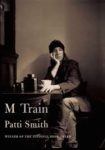 Fact: When I like a book, I destroy its edges with dog-ears. There’s so much that I loved and got out of this book that you’d be hard pressed to find more than twenty pages in a row that don’t have dog-ears fancying them up. The wandering (but never lost) loner in me connects so well with the authentically personal, lonely seeker in Smith, as she reflects on her life, loves, the loss of her dear husband, and the creative pursuits that sometimes help to keep her “light yet lingering malaise” at bay.
Fact: When I like a book, I destroy its edges with dog-ears. There’s so much that I loved and got out of this book that you’d be hard pressed to find more than twenty pages in a row that don’t have dog-ears fancying them up. The wandering (but never lost) loner in me connects so well with the authentically personal, lonely seeker in Smith, as she reflects on her life, loves, the loss of her dear husband, and the creative pursuits that sometimes help to keep her “light yet lingering malaise” at bay.
In-Between Days by Teva Harrison (House of Anansi Press, 2016)
Fact: Over the summer of 2016, I reconnected with two people with 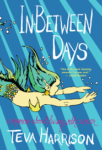 whom I’d worked but had drifted away from over the last handful of years. A man and a woman, both very different from each other but both earnest, wonderful, and good people. And both revealed to me that they either had experienced or were currently living with life-threatening diseases, one of which still has no cure. I was floored then, and continue to be now, when I think about it—both in their late-30s, both experiencing excruciating pain at times, and often, feeling hopeless and alone in their illnesses. I was gifted Teva Harrison’s In-Between Days by a friend who somehow knew that I needed to read Harrison’s words and really take in the imagery she presents, of a body fighting itself and at the same time, a survivor fighting to “liv[e] life with a sense of wonder and delight.”
whom I’d worked but had drifted away from over the last handful of years. A man and a woman, both very different from each other but both earnest, wonderful, and good people. And both revealed to me that they either had experienced or were currently living with life-threatening diseases, one of which still has no cure. I was floored then, and continue to be now, when I think about it—both in their late-30s, both experiencing excruciating pain at times, and often, feeling hopeless and alone in their illnesses. I was gifted Teva Harrison’s In-Between Days by a friend who somehow knew that I needed to read Harrison’s words and really take in the imagery she presents, of a body fighting itself and at the same time, a survivor fighting to “liv[e] life with a sense of wonder and delight.”
Notes from a Feminist Killjoy by Erin Wunker (BookThug, 2016)
 Fact (maybe more of a disclosure?): I worked with Erin Wunker and editor Julie Joosten on the copy editing and proofing of this book. Also, I took a number of anthropology and sociology courses on gender back in my university days. Reading Wunker’s thoughtful and critical words on being a feminist in a fraught world reminded me of who I used to be and has galvanized me to be that person again. Wunker is “taking a risk here.” But in doing so, she puts forward a provocative and, I think, lasting commentary on the urgent need for a feminism that keeps working, questioning, and striving to create change.
Fact (maybe more of a disclosure?): I worked with Erin Wunker and editor Julie Joosten on the copy editing and proofing of this book. Also, I took a number of anthropology and sociology courses on gender back in my university days. Reading Wunker’s thoughtful and critical words on being a feminist in a fraught world reminded me of who I used to be and has galvanized me to be that person again. Wunker is “taking a risk here.” But in doing so, she puts forward a provocative and, I think, lasting commentary on the urgent need for a feminism that keeps working, questioning, and striving to create change.
John Schmidt, Web Media Marketing Manager
Rich and Poor by Jacob Wren (BookThug, 2016) Following the personal and political drama surrounding main characters 1 and 2 was a welcome escape from the 1s and 0s in which I’m usually immersed.
Elon Musk: Tesla, SpaceX, and the Quest for a Fantastic Future by Ashlee Vance (Ashlee Vance, 2015)
A fascinating look at the life of an enigmatic tech and business visionary.
Throwing Rocks at the Google Bus by Douglas Rushkoff (Penguin, 2016)
Understand how the economy got to where it is, how we got to where we are, and what can be done about both.
East of Eden by John Steinbeck (1952)
No other book has made me feel more while reading than this one. Ever.
RATS NEST by Mat Laporte (BookThug, 2016)
Dear Santa, this is what I would like for Christmas.
Kate Hargreaves, Book Designer Extraordinaire, and author of Leak (2014)
Throaty Wipes by Susan Holbrook
(Coach House Books, 2016)
Notes from a Feminist Killjoy by Erin Wunker
(BookThug, 2016)
A Guide to Being Born: Stories by Ramona Ausubel (Penguin, 2013)
Modern Romance by Aziz Ansari (Penguin, 2016)
Bonus:
Reid Millar, Theatre Student at York University and lead singer of BBQ Pope
Mother Courage and Her Children by Bertolt Brecht
Less than Zero by Bret Easton Ellis
Concord Floral by Jordan Tannahill
Waiting for Godot by Samuel Beckett
Cole Millar, Lover of comic books, YouTuber and gamer
Ghosts by Raina Telgemeier
Sisters by Raina Telgemeier
DeadPool: Paws by Stefan Petrucha
❧

